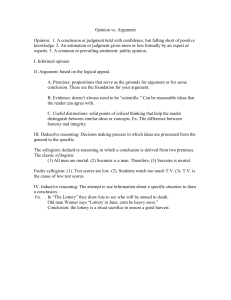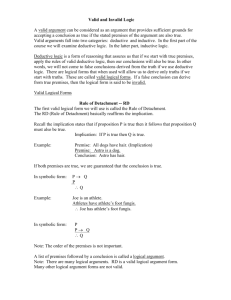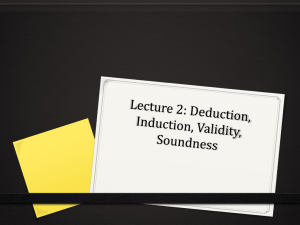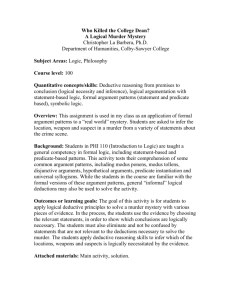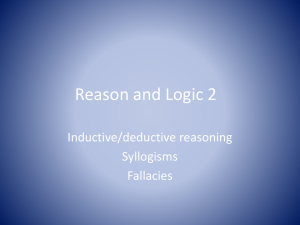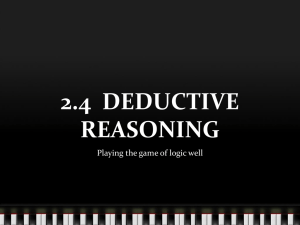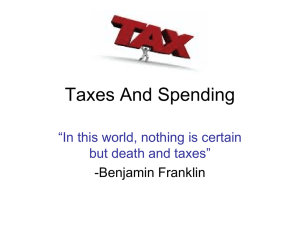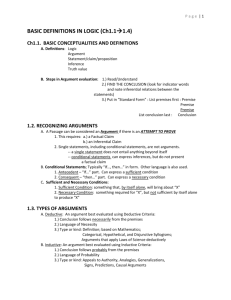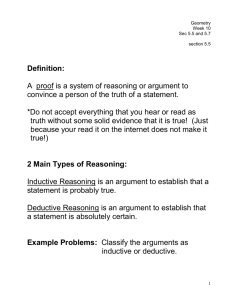3 Basic Types of Reasoning
advertisement
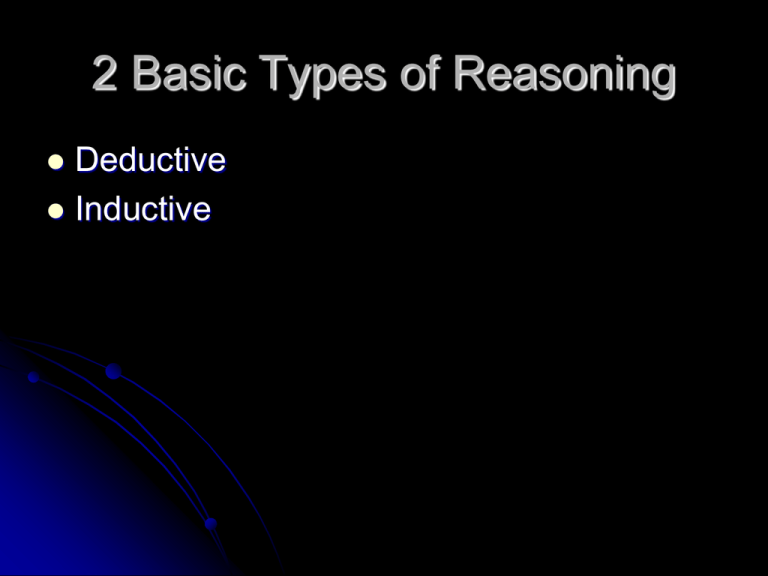
2 Basic Types of Reasoning Deductive Inductive Deductive Reasoning Attempts to provide sufficient (or conclusive) evidence for the conclusion Deductive reasoning can be recognized by the structure of the argument and sometimes by the conclusion offered Inductive Reasoning Attempts to make the conclusion probable or likely—evidence is not intended to be conclusive Typically recognized by probabilistic claims in either or both of the premises and conclusions Includes statistical and demographic reasoning, predictions, analogies and explanations Some Examples Either Bob or Joe was going to win the award. Bob didn’t win, so Joe must have. I think Wayne committed the murder. He had the motive, he had the opportunity, his bloody glove was found on the scene, and he has no alibi. I’m sure Alice knows how to swim. After all, most people know how to swim. More Examples If you stop smoking, you’ll live longer. Current research shows that on average, non-smokers live 5.5 years longer than smokers. If we stick with our current quarterback, our team probably won’t get any better. He’s had a few years now, and we haven’t improved yet. Perhaps it’s time for someone new. Since 2 x 2=4, and 22 is the same as 2 x 2, then 22=4. Judging Validity A deductive argument is judged on 2 criteria: validity and soundness An argument is valid if the truth of the premises would guarantee the truth of the conclusion An argument is invalid if the conclusion could be false even if all the premises are true N.B.: This judgment is purely formal—it has nothing to do with the truth of either premises or conclusions Some Examples Either the kitchen is on fire, or my pot roast is burning. I can see the kitchen’s not on fire, so my pot roast must be burning. All CEOs are wealthy. Martin is wealthy, so he must be a CEO. Only Democrats would vote for Hilary Clinton. Wade is a Democrat, so he must have voted for Hilary. More Examples Deceptive advertising is no different from lying. Since lying is wrong, so too is deceptive advertising. Republicans support tax cuts for the wealthy. George is a Republican, so he must support tax cuts for the wealthy. Republicans support tax cuts for the wealthy. John supports tax cuts for the wealthy, so he must be a Republican. Argument Forms There are some argument form that are always valid They are: Modus Ponens, Modus Tollens, Categorical Syllogism, Disjunctive Syllogism, Hypothetical Syllogism and Constructive Dilemma Argument Forms Continued There are two argument structures that are always invalid. They are: Affirming the Consequent and Denying the Antecedent Soundness and Unsoundness A deductive argument is sound is (1) it is valid, and (2) its premises are true. A deductive argument is unsound if either (1) it is invalid, or (2) it is valid, but at least one premise is false Some Examples All men are mortal. Socrates is a man, therefore Socrates is mortal. Either the moon is made or green cheese, or I’m the Pope. Unfortunately, the moon IS made of green cheese, so I’m sadly not the Pope. If the General Manager was retained, our team’s losing ways were bound to continue. Since I see we aren’t winning yet, we must have retained the General manager. Only rock stars and athletes are wealthy. Since Ellen is pretty wealthy, she must be either a rock star or an athlete.
